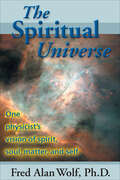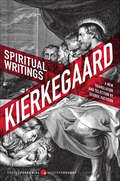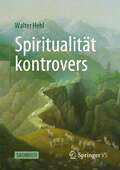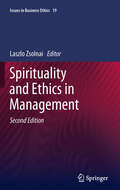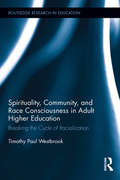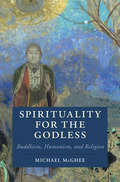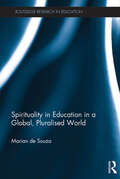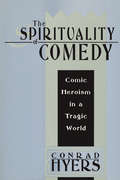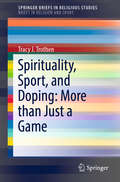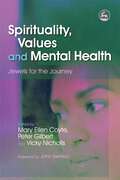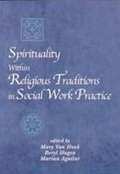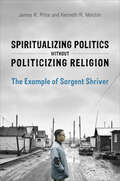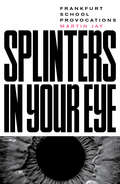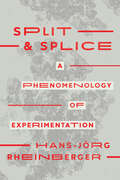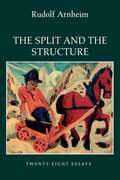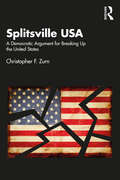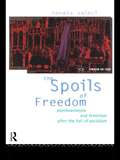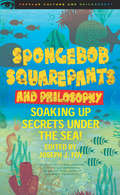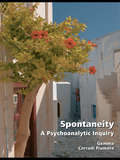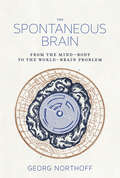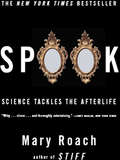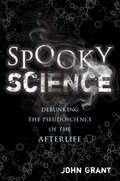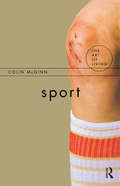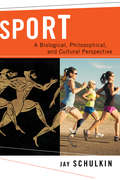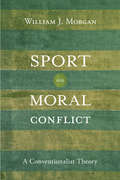- Table View
- List View
The Spiritual Universe: One Physicist's Vision of Spirit, Soul, Matter, and Self
by Fred Alan WolfFrom a National Book Award winner, “methodical and clear . . . provides physics-phobics a wide bridge to understanding some often arcane material” (Booklist).Why do we believe in the soul? Does it actually exist? If so, what is it? Does it differ from the self? Does it survive the body after death? In The Spiritual Universe, Fred Alan Wolf brings the most modern perspective of quantum physics to the most ancient questions of religion and philosophy. Taking the reader on a fascinating tour of both Western and Eastern thought, Wolf explains the differing view of the soul in the works of Plato, Aristotle, and St. Thomas, the ancient Egyptian’s belief in the nine forms of the soul, the Qabalistic idea of the soul acting in secret to bring spiritual order to a chaotic universe of matter and energy, and the Buddhist vision of a “nonsoul.” Wolf then mounts a defense of the soul against its modern critics who see it as nothing more than the physical body.“One of the few pathfinders who have discovered the versatility and potency of the new quantum paradigm based on consciousness.” —Amit Goswami, Professor of Physics and author of The Self-Aware Universe“The questions are exhilarating and the conclusions are properly mysterious and profoundly inconclusive . . . you’ll love the spirited journey.” —Thomas Moore, author of Care of the Soul and The Re-Enchantment of Everyday Life“Wolf is a new Thales for a new physics of the soul; his book will blow your mind and quicken your spirit.” —Michael Grosso, Ph.D., author of The Millennium Myth and Frontiers of the Soul
Spiritual Writings: A New Translation and Selection (Harper Perennial Modern Thought Ser.)
by Soren Kierkegaard George Pattison“By far the most profound thinker of the 19th century” —Ludwig Wittgenstein “Kierkegaard’s great contribution to Western philosophy was to assert, or to reassert with Romantic urgency, that, subjectively speaking, each existence is the center of the universe.” —John Updike, The New YorkerHarper Perennial Modern Classics presents the rediscovered spiritual writings of Søren Kierkegaard, edited and translated by Oxford theologian George Pattison. Called “the first modernist” by The Guardian and “the father of existentialism” by the New York Times, Kierkegaard left an indelible imprint on existential writers from Sartre and Camus to Kafka and Derrida. In works like Fear and Trembling, Sickness unto Death, and Either/Or, he by famously articulated that all meaning is rooted in subjective experience—but the devotional essays that Patterson reveals in Spiritual Writings will forever change our understanding of the great philosopher, uncovering the spiritual foundations beneath his secularist philosophy.
Spiritualität kontrovers
by Walter HehlDas Buch versucht einen fairen Blick auf Spiritualität und Spirituelles aus Sicht der Physik und der modernen Geistesauffassung. So vieles soll spirituell sein, aber was ist es wirklich? Es gibt Aberglauben, Betrug und Illusionen einerseits und moderne Wissenschaft andererseits. Die Wissenschaft zeigt, was Geist ist, dass es unendlich Großes und unendlich Kleines gibt, dass wir so Vieles berechnen können - aber es bleibt das Mysteriöse. Manches in der Wissenschaft ist unmittelbar spirituell, etwa die Figuren von Lichtenberg und Chladni im 18. Jahrhundert und die Kirlian-Fotographie und Tesla-Kugeln heute. Vieles verstehen wir nur oberflächlich. Wenn es der Computer versteht und wir nicht, können wir nicht zufrieden sein. Die Grenzen des Wissens sind weit nach außen verschoben, aber wir sind klein geblieben. Wir stoßen an Grenzen und begegnen Spirituellem: im Unendlichen, im Unausweichlichen und im Unfassbaren. Diese Grenzen sollten uns demütig machen. Die moderne Wissenschaft zeigt diese Grenzen auf. Die Spiritualität ist dann eher die Erfahrung des Mysteriösen des Physikers Albert Einstein. Es gibt Spirituelles, etwa wie eh und je den Anblick des Sternenhimmels oder des Ozeans. Auch heute sind Orte wie Stonehenge spirituelle Plätze oder Kraftörter. Der Magnetismus im Elektrofahrzeug ist so spirituell wie im Magnetstein der Antike. Besonders spirituell ist die Verbindung der Natur mit der Mathematik.
Spirituality and Ethics in Management
by Laszlo ZsolnaiThe book - which was originally published by Kluwer in 2004 - is a collection of scholarly papers focusing on the role of spirituality and ethics in renewing the contemporary management praxis. The basic argument is that a more inclusive, holistic and peaceful approach to management is needed if business and political leaders are to uplift the environmentally degrading and socially disintegrating world of our age. The book uses diverse value-perspectives (Hindu, Catholic, Buddhist, and Humanist) and a variety of disciplines (philosophy, ethics, management studies, psychology, and organizational sciences) to extend traditional reflections on corporate purpose and focuses on a self-referential organizational-existential search for meaning, identity and success.
Spirituality, Community, and Race Consciousness in Adult Higher Education: Breaking the Cycle of Racialization (Routledge Research in Education)
by Timothy Paul WestbrookDrawing on the lived experiences of Black students in adult degree completion programs at predominantly White, Christian institutions in the southern United States, this book presents a model for reimagining adult higher education. Westbrook explores the reasons students enrolled in degree programs, how they experience their predominantly white institutions, and how their experiences affect their lives. Employing Critical Race Theory and Christian theology as frameworks for evaluating the students’ experiences, the author sheds light on the ways African American experiences to inform, critique, and shape Christian adult learning in higher education.
Spirituality for the Godless: Buddhism, Humanism, and Religion (Cambridge Studies in Religion, Philosophy, and Society)
by Michael McGheeMany people describe themselves as secular rather than religious, but they often qualify this statement by claiming an interest in spirituality. But what kind of spirituality is possible in the absence of religion? In this book, Michael McGhee shows how religious traditions and secular humanism function as 'schools of wisdom' whose aim is to expose and overcome the forces that obstruct justice. He examines the ancient conception of philosophy as a form of ethical self-inquiry and spiritual practice conducted by a community, showing how it helps us to reconceive the philosophy of religion in terms of philosophy as a way of life. McGhee discusses the idea of a dialogue between religion and atheism in terms of Buddhist practice and demonstrates how a non-theistic Buddhism can address itself to theistic traditions as well as to secular humanism. His book also explores how to shift the centre of gravity from religious belief towards states of mind and conduct.
Spirituality in Education in a Global, Pluralised World (Routledge Research in Education)
by Marian de SouzaA particular problem associated with international research in the field of spirituality and education is the reluctance of scholars to agree on what spirituality means, with numerous descriptions increasing ambiguity and reducing the impact of research in the discipline. This book argues that it is important to understand spirituality as a unifying concept that has the potential to be meaningful in its application to the lives of children and young people in areas of learning and wellbeing. Chapters show why and how spiritual learning should be addressed across the curriculum, with implications for the design of learning programs and environments.
The Spirituality of Comedy: Comic Heroism in a Tragic World
by Conrad HyersTo understand comedy is to understand humanity, for the comic sense is central to what it means to be human. Nearly all the major issues with which human beings have exercised themselves are touched upon in some manner by the comic spirit. Yet education in the art of comedy and in comic appreciation is given little attention in most societies. The Spirituality of Comedy explores the wisdom of comedy and the comic answer to tragedy (in both popular and classical senses of the term). Tragedy is seen as a fundamental problem of human existence, while comedy is its counterweight and resolution.Conrad Hyers has taken a fresh look at comedy from the standpoint of comparative mythology and religion, and thus comedy's spiritual significance. In his unique study of the comic tradition, Hyers explains the difficulty in pinning down themes, structures, plots, or characters that are common to all comedy. Instead he argues that there is an essence of comedy in the area of pattern. He draws upon the rich historical ensemble of types of comic figures: the humorist, comedian, comic hero, rogue, trickster, clown, fool, underdog, and simpleton. He shows how each type incarnates a comic heroism in its own unique manner, offering a profound wisdom and philosophy of life.The approach of this book is broadly interdisciplinary, with materials and interpretations introduced from the various fields of the humanities, social sciences, and natural sciences as they illuminate both the tragic and comic sensibilities. The methodological thread that draws this all together is an analysis of the major types of comic figures in terms of the myths and legends associated with them, the rituals they produce and enact, and the symbolism of the comic figures themselves. Written in a very readable literary style, The Spirituality of Comedy will appeal to psychologists, social scientists, clergy, philosophers, and students of literature.
Spirituality, Sport, and Doping: More than Just a Game (SpringerBriefs in Religious Studies)
by Tracy J. TrothenThis book explores the deeper meaning of sports. Drawing on contemporary research, the author makes a strong case for why we should see sport not only in terms of religion but--more importantly-as a possible location for spiritual meaning. Taking this a step farther, she considers how gene editing, robotics, and other biomedical technological enhancements affect not only sports performances but experiences of sport as sacred. In addition, the author explores what difference it might make to the enhancement debate if sports’ spirituality is taken seriously. The author is not afraid to explore the issue in all its complexity. Yet, the argument she presents is both meaningful and accessible. This investigation applies insights from Christian theology, applied ethics, psychology, and sports studies. From lightweight tennis racquets to anabolic steroids, athletes have long used technology and science to improve their performances. But, until now, no one has asked how biomedical technological enhancements might affect the undervalued spiritual dimension of sport. This book presents rich insights into the connection between sports, spirituality, and human enhancement technologies. It will appeal to researchers, athletes and sports followers, and undergraduate and graduate students in ethics, sport, religion or theology.
Spirituality, Values and Mental Health: Jewels for the Journey
by Nigel Mills Paul Chapple Luftha Meah Sarajane Aris Thurstine Basset Abina Parshad-Griffin Chris Mackenna Christopher Newell Wendy Edwards Kim Woodbridge Mary Ellen Coyte Barbara Pointon Ali Jan Haider Mark Bones Paul Grey Anne Roberts B Spalek Frances Basset Tom Gordon Julia Head Ju Blencowe Veronica Dewan Bill K. W. M. Fulford Cameron Langlands Neil Thompson Arthur Hawes Brian Thorne Fatima Kassam Peter Bates Vicky Nicholls Peter Gilbert David Mitchell Choman Hardi Premila Trevedi Andrew Powell Fozia Sarwar Sarah Carr Suman Fernando John Foskett John Swinton Azim KidwaiSpirituality, religious belief and inclusive faith communities are important for mental well being but mental health practitioners have few guidelines for acknowledging these issues when working with service users. Spirituality, Values and Mental Health gathers together personal and professional contributions from mental health professionals, carers and mental health service users and survivors. It addresses the stigma that can surround both mental health and spirituality and explores the place of the spiritual in mental health care, teasing out its implications for research, education, training and good practice. This book is a welcome source of ideas and common-sense that is essential reading for mental health practitioners, carers and service users, chaplains, faith leaders, faith communities, as well as students and professionals working in the field of spirituality and mental health.
Spirituality Within Religious Traditions in Social Work Practice
by Mary Van Hook Beryl Hugen Marian AguilarThis text for social workers and other counselors discusses how religious traditions shape people's lives and help them construct meaning about the world around them. Each of the 14 contributions from academics and clinicians describes the history of a particular religion, some of its rituals, basic beliefs, and its implications for social work practice. Some of the faiths profiled include Islam, Judaism, Native American spirituality, Hinduism, Buddhism, Catholicism, Mormonism, and the African-American Baptist tradition. Annotation c. Book News, Inc., Portland, OR (booknews.com)
Spiritualizing Politics without Politicizing Religion: The Example of Sargent Shriver
by Kenneth R. Melchin James R. PriceThe clash of religion and politics has been a steady source of polarization in North America. In order to think wisely and constructively about the spiritual dimension of our political life, there is need for an approach that can both maintain the diversity of belief and foster values founded on the principles of religion. In Spiritualizing Politics without Politicizing Religion, James R. Price and Kenneth R. Melchin provide a possible framework, approaching issues in politics via a profile of Sargent Shriver (1915-2011), an American diplomat, politician, and a driving force behind the creation of the Peace Corps. Focusing on the speeches Shriver delivered in the course of his work to advance civil rights and build world peace, Price and Melchin highlight the spiritual component of his efforts to improve institutional structures and solve social problems. They contextualize Shriver’s approach by contrasting it with contemporary, landmark decisions of the U.S Supreme Court on the role of religion in politics. In doing so, Spiritualizing Politics without Politicizing Religion explains that navigating the relationship of religion and politics requires attending to both the religious diversity that politics must guard and the religious involvements that politics needs to do its work.
Splinters in Your Eye: Essays on the Frankfurt School
by Martin JayAssessing the legacy of the Frankfurt School in the twenty-first centuryAlthough successive generations of the Frankfurt School have attempted to adapt Critical Theory to new circumstances, the work done by its founding members continues in the 21st century to unsettle conventional wisdom about culture, society and politics. Exploring unexamined episodes in the School's history and reading its work in unexpected ways, these essays provide ample evidence of the abiding relevance of Horkheimer, Adorno, Benjamin, Marcuse, Löwenthal, and Kracauer in our troubled times. Without forcing a unified argument, they range over a wide variety of topics, from the uncertain founding of the School to its mixed reception of psychoanalysis, from Benjamin's ruminations on stamp collecting to the ironies in the reception of Marcuse's One-Dimensional Man, from Löwenthal's role in Weimar's Jewish Renaissance to Horkheimer's involvement in the writing of the first history of the Frankfurt School. Of special note are their responses to visual issues such as the emancipation of color in modern art, the Jewish prohibition on images, the relationship between cinema and the public sphere, and the implications of a celebrated Family of Man photographic exhibition. The collection ends with two essays tracing the still metastasizing demonization of the Frankfurt School by the so-called Alt Right as the source of "cultural Marxism" and "political correctness," which has gained alarming international resonance and led to violence by radical right-wing fanatics.
Split and Splice: A Phenomenology of Experimentation
by Hans-Jörg RheinbergerAn esteemed historian of science explores the diversity of scientific experimentation. The experiment has long been seen as a test bed for theory, but in Split and Splice, Hans-Jörg Rheinberger makes the case, instead, for treating experimentation as a creative practice. His latest book provides an innovative look at the experimental protocols and connections that have made the life sciences so productive. Delving into the materiality of the experiment, the first part of the book assesses traces, models, grafting, and note-taking—the conditions that give experiments structure and make discovery possible. The second section widens its focus from micro-level laboratory processes to the temporal, spatial, and narrative links between experimental systems. Rheinberger narrates with accessible examples, most of which are drawn from molecular biology, including from the author’s laboratory notebooks from his years researching ribosomes. A critical hit when it was released in Germany, Split and Splice describes a method that involves irregular results and hit-or-miss connections—not analysis, not synthesis, but the splitting and splicing that form a scientific experiment. Building on Rheinberger’s earlier writing about science and epistemology, this book is a major achievement by one of today’s most influential theorists of scientific practice.
The Split and the Structure: Twenty-Eight Essays
by Rudolf ArnheimRudolf Arnheim's great forte is his ability to illuminate the perceptual processes that go into the making and reception of artworks—painting, sculpture, architecture, and film. Over the years, his pioneering mode of "reading" art from a unique scientific/philosophic perspective has garnered him an established and devoted audience. That audience will take pleasure in Arnheim's most recent collection of essays, one that covers a range of topics and includes titles such as "Outer Space and Inner Space," "What Is an Aesthetic Fact?," "As I Saw Children's Art," "Two Ways of Being Human," "Consciousness—an Island of Images," and "From Chaos to Wholeness."The notion of structure is Arnheim's guide in these explorations. Most of the essays examine the nature of structure affirmatively: how it comes about, its incentives and objectives, its celebration of perfection. He is interested in how artists grope for structure to shape powerful, enlightening images, and how a scientist's search for truth is a search for structure.Writing with enviable clarity, even when deploying complex arguments, Arnheim makes it easy and exciting to follow him as he thinks. America is not abundantly supplied with "public intellectuals" such as Rudolf Arnheim—to have his writings with us is cause for celebration. "The word 'structure' appears for good reason in the title of this collection. . . . Structure seems to be needed as an arbiter wherever this civilization of ours is split by selfish interests and fighting for either/or decisions. The essays want to speak with the voice of reason, because they want to show how the parts require the whole."
Splitsville USA: A Democratic Argument for Breaking Up the United States
by Christopher F. ZurnSplitsville USA argues that it’s time for us to break up to save representative democracy, proposing a mutually negotiated, peaceful dissolution of the current United States of America into several new nations. Zurn begins by examining the United States’ democratic predicament, a road most likely headed for electoral authoritarianism, with distinct possibilities of ungovernability and violent civil strife. Unlike others who share this diagnosis, Zurn presents a realistic picture of how we can get to reform and what it would involve. It is argued that "Splitsville" represents the most plausible way for American citizens to continue living under a republican form of government. Despite recent talk of secession and civil war, this book offers the most extensive treatment yet of the issues we need to think through to enable a peacefully negotiated political divorce. Splitsville USA is a provocative conversation opener about the problems that have gotten us into our current political pickle and how to get out of it by seizing the reins of our own constitutional destiny. The book will appeal to readers of political science, American politics, history, political philosophy, and law, along with all general readers interested in the future of democracy in the United States.
The Spoils of Freedom: Psychoanalysis, Feminism and Ideology after the Fall of Socialism (Opening Out: Feminism for Today)
by Renata SaleclThe rise of nationalist, racist and anti-feminist ideologies is one of the most frightening repercussions of the collapse of socialism. Using psychoanalytic theories of fantasy to investigate why such extremist ideologies have taken hold, Renata Salecl argues that the major social and political changes in post-communist Eastern Europe require a radical re-evaluation of notions of liberal theories of democracy. In doing so she offers a new approach to human rights and feminism grounded in her own active partipation in the struggles, first against communism and now against nationalism and anti-feminism.
SpongeBob SquarePants and Philosophy
by Joseph J. FoySpongeBob SquarePants and Philosophy introduces fans of SpongeBob SquarePants to some of the great thinkers and questions in philosophy. The essays can be shared by young and old alike, kindling new interest in philosophy and life's big questions. What keeps SpongeBob "reeling in" major audiences on a daily basis is that underneath the lighthearted and whimsical exterior are the seeds of philosophical discussions about identity and the self, our obligations toward others, benefits and tensions of the individual in community, principles of the marketplace and environmental ethics, and questions of just how exactly Jack Kahuna Laguna can build a fire at the bottom of the ocean. (Okay, so perhaps we don't have an answer for that last one, but maybe if you look into that fire long enough the answer will be revealed.)The book begins with a section exploration of the major characters of the series. For instance, chapter 1 uses the philosophies of Aristotle to demonstrate why SpongeBob, more than any other character in the series, is defined by a life of well-being and flourishing. Chapter two provides an assessment of SpongeBob's best friend, Patrick Star.
Spontaneity: A Psychoanalytic Inquiry
by Gemma Corradi FiumaraPsychoanalytic theory frequently explains psychopathology from the perspective of either inadequate early care or as the result of environmental factors. In this book the author suggests that poor mental health can be a result of our incapacity to respond to internal and external stimuli, and indicates that spontaneity is essential in the development of many aspects of the self. It is not what happens to us, but how we react to events, that forms who we are. Spontaneity presents an original approach to issues of agency, spontaneity and creativity in psychoanalysis by exploring questions including: active internalisation paradox forgiveness responsibility empathy self de-creation. This book will be essential reading for psychoanalysts, psychotherapists, philosophers and psychologists. It will also prove to be engaging for those interested in psychoanalytic theory and theories of subjectivity.
The Spontaneous Brain: From the Mind-Body to the World-Brain Problem
by Georg NorthoffAn argument for a Copernican revolution in our consideration of mental features—a shift in which the world-brain problem supersedes the mind-body problem. Philosophers have long debated the mind-body problem—whether to attribute such mental features as consciousness to mind or to body. Meanwhile, neuroscientists search for empirical answers, seeking neural correlates for consciousness, self, and free will. In this book, Georg Northoff does not propose new solutions to the mind-body problem; instead, he questions the problem itself, arguing that it is an empirically, ontologically, and conceptually implausible way to address the existence and reality of mental features. We are better off, he contends, by addressing consciousness and other mental features in terms of the relationship between world and brain; philosophers should consider the world-brain problem rather than the mind-body problem. This calls for a Copernican shift in vantage point—from within the mind or brain to beyond the brain—in our consideration of mental features. Northoff, a neuroscientist, psychiatrist, and philosopher, explains that empirical evidence suggests that the brain's spontaneous activity and its spatiotemporal structure are central to aligning and integrating the brain within the world. This spatiotemporal structure allows the brain to extend beyond itself into body and world, creating the “world-brain relation” that is central to mental features. Northoff makes his argument in empirical, ontological, and epistemic-methodological terms. He discusses current models of the brain and applies these models to recent data on neuronal features underlying consciousness and proposes the world-brain relation as the ontological predisposition for consciousness.
Spook: Science Tackles the Afterlife
by Mary RoachThe best-selling author of ?Stiff ?and ?Bonk? trains her considerable wit and curiosity on the human soul. "What happens when we die? Does the light just go out and that's that--the million-year nap? Or will some part of my personality, my me-ness persist? What will that feel like? What will I do all day? Is there a place to plug in my lap-top?" In an attempt to find out, Mary Roach brings her tireless curiosity to bear on an array of contemporary and historical soul-searchers: scientists, schemers, engineers, mediums, all trying to prove (or disprove) that life goes on after we die.
Spooky Science: Debunking the Pseudoscience of the Afterlife
by John GrantA hilarious lampoon of scientific inquiry into the psychic.Life after death, spirit communication, the astral plane, reincarnation: on the relatively rare occasions when scientists have tried to apply their methods to the paranormal, they’ve often ended up embarrassed—fooled by obvious charlatans, deluded into making irrational and unsubstantiated claims, or frustrated in their attempt to find something that just isn’t there.John Grant—author of Discarded Science and Corrupted Science—investigates the pseudoscience of spooky stuff to fascinating and humorous effect. From scamming mediums, to poltergeist fakery, to heavenly hallucinations, Grant spares ardent believers and gullible thinkers no mercy in this rollicking history of psychic “phenomena.”
Sport (The Art of Living)
by Colin McGinnWhether it's conkers in the schoolyard, kicking a football in the park, or playing tennis on Wimbledon Centre Court, sport impacts all of our lives. But what is sport and why do we do it? Colin McGinn, renowned philosopher (and kiteboarder), reflects on our love of sport and explores the value it has for us and the part it plays in a life lived well. Written in the form of a memoir, McGinn discusses many of the sports he has engaged in - from pole-vaulting and gymnastics to windsurfing and tennis - and describes the athletic experience from the inside, as a participant, articulating what is uniquely valuable about sport as an activity. Sport, argues McGinn, takes us to our fullest potential as human beings, it's what we fling at mortality to keep it at bay, a holiday from the Unbearable Heaviness of Being. "Sport" expresses our nature, it bears upon our self-realization. If a happy life consists in one that expresses fully our natural faculties, then sports must play an essential role in our lifes. Mind-body unity, the nature of practical knowledge and physical skill, success and failure, the ethics of competition, peak experiences, the spectacle of professional sport, aesthetics and death, McGinn discusses these and many other issues while telling of his own sporting mishaps and adventures. To use the vernacular of philosophy, "Sport" captures the phenomenology of sport - what it's like to do it - and in doing so shows how sport is a way of expressing and understanding who and what we are, way beyond whether we are a good sportsman, a bad loser or a team-player. For anyone who has ever thought that there must be less humiliating ways to enjoy yourself than being thrashed on the tennis court, "Sport" will reassure you that it's time not wasted.
Sport: A Biological, Philosophical, and Cultural Perspective
by Jay SchulkinSports are as varied as the people who play them. We run, jump, and swim. We kick, hit, and shoot balls. We ride sleds in the snow and surf in the sea. From the Olympians of ancient Greece to today's professional athletes, from adult pickup soccer games to children's gymnastics classes, people at all levels of ability at all times and in all places have engaged in sport. What drives this phenomenon?In Sport, the neuroscientist Jay Schulkin argues that biology and culture do more than coexist when we play sports—they blend together seamlessly, propelling each other toward greater physical and intellectual achievement. To support this claim, Schulkin discusses history, literature, and art—and engages philosophical inquiry and recent behavioral research. He connects sport's basic neural requirements, including spatial and temporal awareness, inference, memory, agency, direction, competitive spirit, and endurance, to the demands of other human activities. He affirms sport's natural role as a creative evolutionary catalyst, turning the external play of sports inward and bringing insight to the diversion that defines our species. Sport, we learn, is a fundamental part of human life.
Sport and Moral Conflict: A Conventionalist Theory
by William J. MorganWhat is the purpose of sport, and how are ethical conceptions of sport shaped by the answers to this question? In Sport and Moral Conflict, William Morgan investigates, examining sport as a moral crucible that puts athletes in competitive, emotionally charged situations where fairness and equality are contested alongside accomplishment. Morgan looks at the modern Olympics—from 1906 Athens to 1924 Paris, when the Games reached international prestige — in order to highlight the debate about athletic excellence and the amateur-professional divide. Whereas the Americans emphasized winning, the Europeans valued a love of the game. Morgan argues that the existing moral theories of sport—formalism and broad internalism (aka interpretivism), which rely on rules and general principles—fall short when confronted with such a dispute as the transition from amateur to professional sport. As such, he develops a theory of conventionalism, in which the norms at work in athletic communities determine how players should ethically acquit themselves. Presenting his case for an ethical theory of sport, Morgan provides insights regarding the moral controversies and crises that persist today.
